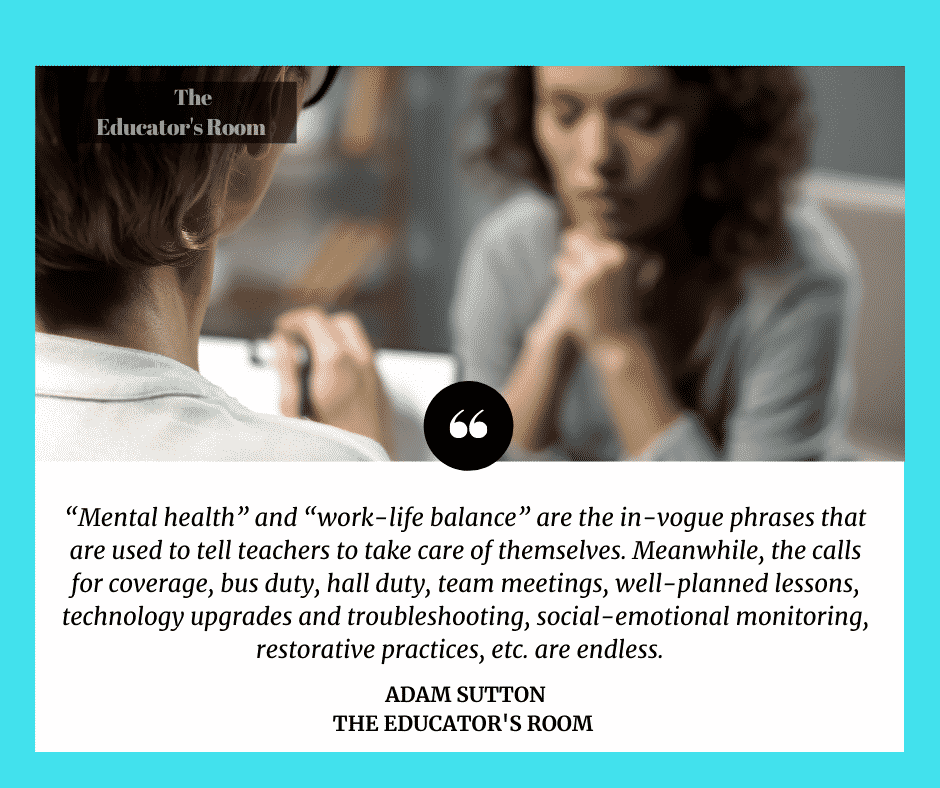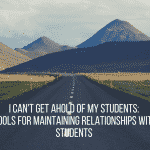“When we get back to normal” is the attitude helping people see through the difficulty that has been the COVID-19 pandemic.
[bctt tweet=”Abusing teachers is normal. Normal is not a destination worth seeking.” username=””]
“Mental health” and “work-life balance” are the in-vogue phrases that are used to tell teachers to take care of themselves. Meanwhile, the calls for coverage, bus duty, hall duty, team meetings, well-planned lessons, technology upgrades and troubleshooting, social-emotional monitoring, restorative practices, etc. are endless.
Teachers are expected to manage their health, but when they stand up and say, “I can’t do coverage,” or “I’ve got to take a day off,” the response is tepid. Teachers are told they have to support one another by taking an Advil so their colleagues won’t have extra work. Failing to toe the line brings quick questions about commitment and work ethic.
[bctt tweet=”COVID-19 has exposed the true cost of being a teacher. It’s not a bigger salary elsewhere. It’s the hours lost. It’s the cavalier attitude towards leisure and freedom. ” username=””]
A recent conversation unveiled the extent to which teachers specifically, and Americans generally, are wedded to their work. We define ourselves by our work. We judge ourselves by how hard and how many hours we work. It is the expectation that work should intermingle and disrupt one’s personal life.
One teacher explained that her husband worked outside of education and frequently worked beyond his typical work hours; it was the expectation in many career sectors.
This is not an explanation. It is an excuse from an abuse victim. Others have it the same or worse, so I can’t complain. The fact that other people are being exploited and abused by their employers doesn’t make the practice acceptable or excusable. It exemplifies how widespread abuse, and acceptance of that abuse are in American workplaces.
Then, there was the attitude that the problem is with the teacher, not the system. One teacher lamented, “I can’t imagine any teacher would go into the profession not knowing there is more work to do than can be completed in the minimal planning time given.” Others added their anecdotes about how they adjusted to the system’s excessive demands.
Again, this is how a victim rationalizes abuse. It’s my fault for not seeing or understanding the potential for abuse early on in the relationship. It’s my job to avoid triggering the abuse.
No. That’s wrong.
Americans are conditioned to believe that when their employer asks for more the response must be “yes.” We should count ourselves lucky to have gainful employment. Those who collect a paycheck and criticize their treatment are whiners or lazy.
For those unconvinced that teachers are overworked, remember all the memes and videos referring to life trapped at home with school-aged kids. The hysterical apologies for underestimating what it was to be surrounded by children all day, every day. Even today, how many parents want their kids at school because it’s beyond tough trying to help them at home?
Paying teachers more is the most common and easiest proposal to placating angry teachers and attracting talent to ease the teacher shortage. Yes, in some areas of the country, teacher pay is an embarrassment, but the pay is irrelevant to the conversation here. Paying teachers more while continuing to saddle them with duties they cannot fulfill may make some feel better, but it’s not a solution.
Schools need more people. Teachers are trained in content and pedagogy, that’s their specialty. They shouldn’t be on hall duty, bus duty, cafeteria duty, or doing coverage. These jobs are important and essential. They are not beneath a teacher–or anyone’s–dignity. It’s just that time spent on these tasks is poor utilization of teachers’ skills.
Similarly, our solution to kids’ social and emotional struggles shouldn’t be giving teachers an hour of professional development on breathing techniques and mindfulness. But, it is.
A robust, successful, and nurturing school environment requires more than just a teacher’s skill. Students need aides to monitor them at recess, school-based administrators to help with discipline, counselors to guide them through emotional adversity. All too often, teachers fill these roles.
Teachers are entrusted to care and nurture other human beings. Many are motivated by humble notions of service. They want to do well for others. But, when one’s health, well-being, and sanity are in jeopardy, it’s not possible to deliver the best care for others. In a world that needs more compassion and care, we cannot continue to abuse our teachers and expect our children to be unharmed.







Expecting teacher to take on more and more is a problem that has existed for a long time, and has been exacerbated by the pandemic. One of the most frustrating comments a teacher often hears it, “But it only takes a minute”, while being given yet another task to complete. A teacher’s role has become so fragmented it’s a perfect recipe for multi-tasking. And we wonder why the students can’t focus? Sutton’s examples of hall duty, lunch duty, bus duty etc always makes me wonder how doctors would feel if assigned tasks more easily performed by people with less training. No one seems to question that. And that’s because of the R factor. If teachers are not awarded the respect due them by their administrators and managers, how do we expect everyone else to be respect them? Sutton is correct. It is abusive.
Where can/should a teacher report if they’ve been abused at work?